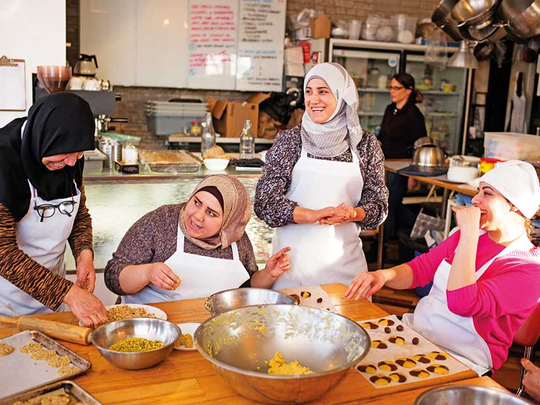
TORONTO: The interior of Soufi’s, a fast-casual restaurant in downtown Toronto, is tailor-made for Instagram. There are white subway tiles, vintage photographs, a chalkboard menu and a selection of bric-a-brac assembled by an owner, Jala Alsoufi, a recent architecture and psychology graduate. The barista (her younger brother, Alaa) even wears the scruffy beard and Blue Jays cap favoured by food-service workers along this hip stretch of Queen Street.
But Soufi’s offers hints of something more unusual than just a place to get lunch. They include the sinuous melodies of old Arabic pop songs, the whiff of sumac and za’atar in the air, and the staff’s yellow-and-black T-shirts proclaiming, “From Syria, With Love.”
Until recently, Syrian cuisine hardly existed in Toronto. With just a few hundred families, the Syrian population was too small to support a restaurant scene. But over the past two years, after the high-profile resettlement of more than 50,000 refugees in Canada, the Toronto area — where more than 11,000 of them live — is experiencing the green shoots of a Syrian-food boom.
Christmas cookies being baked at Newcomer Kitchen, in Toronto.
The entrepreneurs behind these ventures display the diversity of Syria’s refugee population. They are as young as 17 and as old as 70, professors as well as farmers. They identify as Shia, Sunni, Druze, Kurd, Alawite, Christian or just Syrian. Some worked in food businesses back home. Others never cooked in their lives.
In a city whose culinary landscape is proudly defined by its immigrant foods (more than half of all Torontonians are foreign-born), the emergence of Syrian cooking illuminates an immigrant community’s integration into the broader population, and the bridge that food can build to a new life.
But this group’s arrival in Toronto also points to something new. “The Syrians are coming at a time that is very different than other immigrants before them,” said Suresh Doss, a food journalist who focuses on the city’s immigrant shops and restaurants in suburban strip malls.
Unlike the Filipinos or Sri Lankan Tamils (including Doss’ family) who opened food businesses clustered together in immigrant neighbourhoods to cater to their countrymen, the Syrians have spread their enterprises across the Toronto area, at a time when the entire city is obsessed with anything edible.
They can market their meals on platforms like Instagram to a wider audience, tapping into a “visual obsession with food” that Doss says rewards the most “novel, spicy and authentic cuisines” that Torontonians can get their hands on. And Canada’s embrace of the Syrian refugees has brought them a sort of celebrity status that can translate into sales and long-term success.
“There is such a positive attitude toward new businesses that newcomers have been starting here,” said Jala Alsoufi, 23.
In August, Alsoufi opened Soufi’s, one of about a half-dozen Syrian food businesses to appear around Toronto in recent years, with her parents, Shahnaz and Husam, and her brother Alaa, 26. (A younger brother, Ayham, is still in high school.)
Though originally from Damascus, the family lived for two decades in Saudi Arabia, where Husam worked as a civil engineer and Shahnaz as a social worker. Unlike the majority of recent Syrian arrivals, who came as refugees, Jala moved here first in 2012 to study at the University of Toronto, and her family followed three years later. Because Canada did not recognise Husam’s engineering qualifications, and the family quickly learnt about the scarcity of Syrian food in Toronto, they decided to open a restaurant.
“We wanted to highlight Syrian cuisine, which had gotten lost in the shadows of Middle Eastern cuisine,” Jala said, noting how Lebanese and other Arabic restaurants had cloaked their restaurants in a generic “Mediterranean” label, for broader appeal.
Soufi’s is defiantly branded as a Syrian restaurant. Shahnaz, speaking in Arabic as her daughter translated, said the family wanted to demonstrate that Syrians were “more than just victims.” “We wanted to consciously be light and airy,” Jala added, “because even though the situation in Syria is very unfortunate, it is important to show Syrian culture, music and art.”
The Alsoufi family has purposefully struck a balance between traditional Syrian flavours and contemporary Canadian tastes. Soufi’s employees are exclusively young, Syrian refugees. Some wear headscarves and beards, while others prefer tight jeans and rolled-up sleeves. The meat is halal, but beer is served, and a sticker supporting gay, lesbian and transgender causes is displayed on the front door.
The menu is built around two quintessential Syrian street foods: freshly baked mana’eesh flatbread topped with a variety of ingredients, from sujuk (spiced ground beef) to crumbled halloumi cheese with braised, lemony spinach, and knafeh, a warm sweet dish of gooey cheese and phyllo strands, scented with rose water and soaked in syrup.
Jala refuses to make something as overtly fusion-y as a “mana’eesh burrito,” but you can order avocado as a topping, and her vegan kunafah, called “banoffeh,” is made with coconut caramel, bananas and tahini, inspired by her love of banoffee pie, that edible portmanteau of 1970s supermarket staples like sweetened condensed milk and whipped cream.
The first Syrian food business to make its mark here was Crown Pastries, a small bakery opened by the brothers Esmail and Rasoul Alsalha in 2015 in a strip mall along a stretch of road in Scarborough (the eastern quarter of the city) that is dominated by Lebanese butchers and shawarma shops.
The brothers fled to Canada as refugees in 2009 from Aleppo, citing a dangerous situation they declined to discuss. While Esmail finished high school, Rasoul supported him by working in Lebanese bakeries from dawn until dusk, but the goal was always to open a Syrian bakery.
“With other Arab bakeries, you cannot taste the butter or nuts, only sugar,” Rasoul said dismissively.
Crown Pastries is a recreation of their grandfather’s bakery of the same name, which operated in Aleppo’s old city from 1980 until the start of the civil war in 2011, when it was abandoned. It is where both brothers learnt the trade.
Crown Pastries’ speciality is dozens of delicate sweets, layered with hand-folded phyllo dough. There are piles of baklava in various shapes and sizes; birds’ nests of swirled noodles; custard-stuffed semolina and sweet cheese dumplings called halawi jibben; and chocolate mafroukeh, dense chocolate brownies covered in a storm of pistachios, almonds and cashews.
Authentic Syrian ingredients are hard to find in Canada, especially now, as the war goes on. Every six months, Crown Pastries pays more than $500 for a bottle of blood-red Syrian rose water, smuggled across the war’s front lines into Turkey and on to Toronto, because Ismail believes that no other rose water will do.
When he arrived in Toronto, Rasoul imagined it would take him 30 years to open his own business. But the bakery has become so successful that the brothers are already planning to expand.
Canada’s warm welcome to Syrian refugees was a hallmark of Justin Trudeau’s election as prime minister in late 2015, and for many, it remains a potent symbol of Toronto’s multicultural identity. (The city’s motto is “Diversity Our Strength.”) Syrian food businesses drew an overwhelming degree of media attention, and a customer base that extended well beyond people with Middle Eastern backgrounds.
No Syrian food businesses has felt the spotlight more acutely than Newcomer Kitchen, a non-profit group of women who come together each Wednesday to cook a traditional Syrian meal in a small cafe and food business incubator called the Depanneur.
Newcomer Kitchen began in 2016 to give newly arrived Syrian refugees who were temporarily living in airport hotels a chance to cook a meal. But it has grown into a collective of 60 cooks, who rotate in groups of eight to make 50 three-course takeout dinners each week, for $20 apiece.
The group has been the subject of dozens of news stories around the world, and a documentary film is in the works. A year ago, Trudeau visited with the press in tow, and his smiling face is proudly displayed around the kitchen. But expectations that this would lead to government funding for administrative costs have not panned out, and this winter Newcomer Kitchen has appealed to the public for donations. The project’s future is tenuous.
Newcomer Kitchen, at its heart, is a social experiment. “Food isn’t the end goal,” said Cara Benjamin-Pace, a retired software entrepreneur who helped found the group. “It’s the platform and conversation of how to bring people together and keep the culinary traditions of these women at a certain level.”
— New York Times News Service












